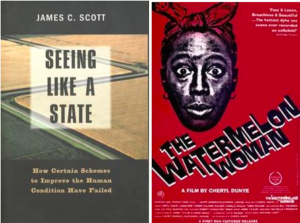
Welcome to Shhh…Secrets of the Librarians, a new series (inspired by our long-running Secrets of the Book Critics) in which bibliothecaries (yes, it’s a real word) from around the country share their inspirations, most-recommended titles, thoughts on the role of the library in contemporary society, favorite fictional librarians, and more. Each week we’ll spotlight a librarian—be they Academic, Public, School, or Special—and bring you into their wonderful world.
This week, we spoke to New York-based academic librarian, author and teacher, Emily Drabinski.
*

Book Marks: What made you decide to become a librarian?
Emily Drabinski: I wanted to be a writer when I grew up, so I scrounged for jobs in magazines after college. I was a fact-checker at a bunch of places like TV Guide, Entertainment Weekly, OUT. My last gig was at Lucky magazine where I found myself counting the total number of bargains inside for the cover line while writing the occasional short take on smoothies or how to choose the best pillow for websites nobody read. After getting in serious trouble for printing the phone number for Saks on a spread about Barneys, I was out. I applied for a job at the public library and got it, and then I applied to library school, and I got in. Meant to be!
BM: What book do you find yourself recommending the most and why?
ED: Seeing Like a State by James C. Scott completely changed the way I think about power and its distribution. What could be more important to understand right now?
BM: Tell us something about being a librarian that most people don’t know?
ED: Many of us are good at making lists, setting up calendars, and taking the minutes. These are the skills most crucial to changing the world, something librarians do every day. The second part of that might be a surprise!
BM: What is the weirdest/most memorable question you’ve gotten from a library patron?
ED: “Can you help me find Kafka’s The Trial? I would like to read it one more time before I die.”
BM: What role does the library play in contemporary society?
ED: Libraries select, acquire, organize, make accessible, and preserve human knowledge, without the need to generate a profit. That is what libraries have always done, and I don’t see those core functions going away any time soon. As the public good is relentlessly plundered by a tiny global elite, the persistence of libraries is both a total surprise and completely necessary.
BM: Who is your favorite fictional librarian?
ED: David Rakoff in The Watermelon Woman. I wish he was still making us laugh and laugh.
*
Emily Drabinski is Critical Pedagogy Librarian at the Graduate Center, CUNY. She edits Gender & Sexuality in Information Studies, a book series from Library Juice Press/Litwin Books, and sits on the board of Radical Teacher, a journal of feminist, socialist, and anti-racist teaching practice.
*
· Previous entries in this series ·

